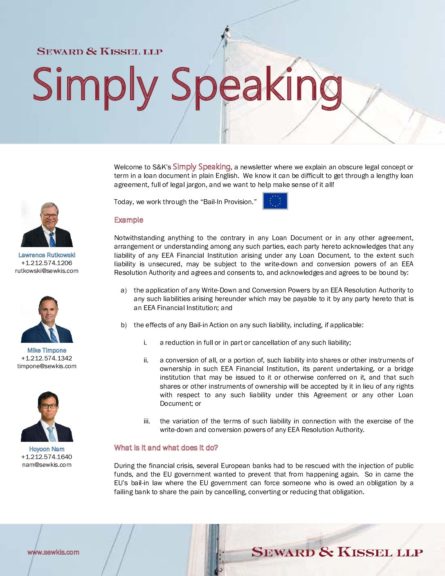
Simply Speaking (January 2019)
Welcome to S&K’s Simply Speaking, a newsletter where we explain an obscure legal concept or term in a loan document in plain English. We know it can be difficult to get through a lengthy loan agreement, full of legal jargon, and we want to help make sense of it all!
Today, we work through the “Bail-In Provision.”
Example
Notwithstanding anything to the contrary in any Loan Document or in any other agreement, arrangement or understanding among any such parties, each party hereto acknowledges that any liability of any EEA Financial Institution arising under any Loan Document, to the extent such liability is unsecured, may be subject to the write-down and conversion powers of an EEA Resolution Authority and agrees and consents to, and acknowledges and agrees to be bound by:
- the application of any Write-Down and Conversion Powers by an EEA Resolution Authority to any such liabilities arising hereunder which may be payable to it by any party hereto that is an EEA Financial Institution; and
- the effects of any Bail-in Action on any such liability, including, if applicable:
- a reduction in full or in part or cancellation of any such liability;
- a conversion of all, or a portion of, such liability into shares or other instruments of ownership in such EEA Financial Institution, its parent undertaking, or a bridge institution that may be issued to it or otherwise conferred on it, and that such shares or other instruments of ownership will be accepted by it in lieu of any rights with respect to any such liability under this Agreement or any other Loan Document; or
- the variation of the terms of such liability in connection with the exercise of the write-down and conversion powers of any EEA Resolution Authority.
What is it and what does it do?
During the financial crisis, several European banks had to be rescued with the injection of public funds, and the EU government wanted to prevent that from happening again. So in came the EU’s bail-in law where the EU government can force someone who is owed an obligation by a failing bank to share the pain by cancelling, converting or reducing that obligation.
Why is it there?
The EU government, by operation of law, can exercise this bail-in power against persons or entities under its jurisdiction, but it may not be able to reach persons or obligations under another law. Therefore, the bail-in law requires a European bank entering into a contract governed by non-EU law to get the contract counterparty to acknowledge EU’s bail-in power, and this is why a loan agreement contains a provision that makes a borrower acknowledge it.
Why is it important (or not so important) to Lender?
This is a legal requirement for European banks (and certain other parties connected to Europe). They have to include this provision in the loan agreement, and there are penalties associated with non-compliance.
How does it affect Borrower in practical terms?
As a practical matter, what matters most to the borrower is any remaining lending commitment, which may be cancelled if the bank gets into financial trouble and needs to be bailed in. Other ancillary obligations like confidentiality, reimbursement or agency functions can in theory be affected but they may not be a huge concern to the borrower.
How is it relevant to shipping?
This provision is prevalent in shipping loan agreements because European banks are active in the space, and the international nature of the transaction involves many contracts that are not governed by the laws of EU member states.
How is it negotiated?
Both LSTA (Loan Syndications and Trading Association) in the US and LMA (Loan Market Association) in the UK have published sample clauses, and they are similar in substance. There is little negotiation because it is a legal requirement, and the industry participants have largely accepted the published clauses.
Questions?
Please contact any one of S&K’s Maritime Practice Team.